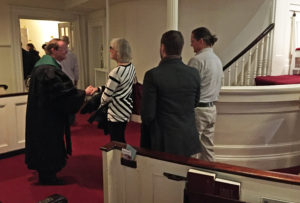 After Jesus’ first sermon, the congregation tried to throw him off a cliff. Since then churches have instituted a receiving line as a way to avoid an unfortunate end to a worship service. The preacher at Plymouth is stationed at the door through which most people exit, but we leave room for the disgruntled to escape without comment.
After Jesus’ first sermon, the congregation tried to throw him off a cliff. Since then churches have instituted a receiving line as a way to avoid an unfortunate end to a worship service. The preacher at Plymouth is stationed at the door through which most people exit, but we leave room for the disgruntled to escape without comment.
This Sunday after she preaches, Liz will have the joy of these conversations. Most of you are quite good at this exchange, but, nonetheless, just to be helpful, here are a few comments you should not make after the sermon:
“Good try.”
“Do you have a cold?”
“I’m just saying it’s 12:30.”
“Why don’t you preach on Revelation?”
“Every sermon you preach is better than the next one.”
“That used to be one of my favorite texts.”
“Where do you get your hair cut?”
“I’ll give you five bucks if you say the word zamboni next Sunday.”
“Do you know if we’re using real eggs for the Easter egg hunt this year?”
“Here’s what I would have done with the sermon.”
“I don’t come to church to be preached at.”
“Let me respond to the tiniest bit of minutiae from your sermon.”
The receiving line is your opportunity to be the preacher’s favorite—and with so little effort. There are so many good things to say. Try one of these on Sunday:
“If you had been my preacher twenty years ago I wouldn’t be so corrupt.”
“You almost make me want to read the Bible.”
“I never thought about that text in that way.”
“I like the Jesus you preach more than the Jesus I grew up with.”
“I talk about prayer a lot, but today I prayed.”
“I feel less tired than when I got here.”
“I remembered some things that matter.”
“I did not enjoy the sermon, but I will think about it.”
“I have a neighbor I haven’t spoken to in ten years. I’m going to talk to her this afternoon.”
“Thank you for being honest.”
“I want our church to do more for hungry children. How should I start?”
“I am going to be more aware of God this week.”
“I think I heard the Spirit invite me to do more.”
The best response to a sermon is not the words you offer the preacher, but a renewed openness to God. As you leave church on Sunday consider shaking Liz’ hand and saying, “I want to be a Christian more than I did an hour ago.”



